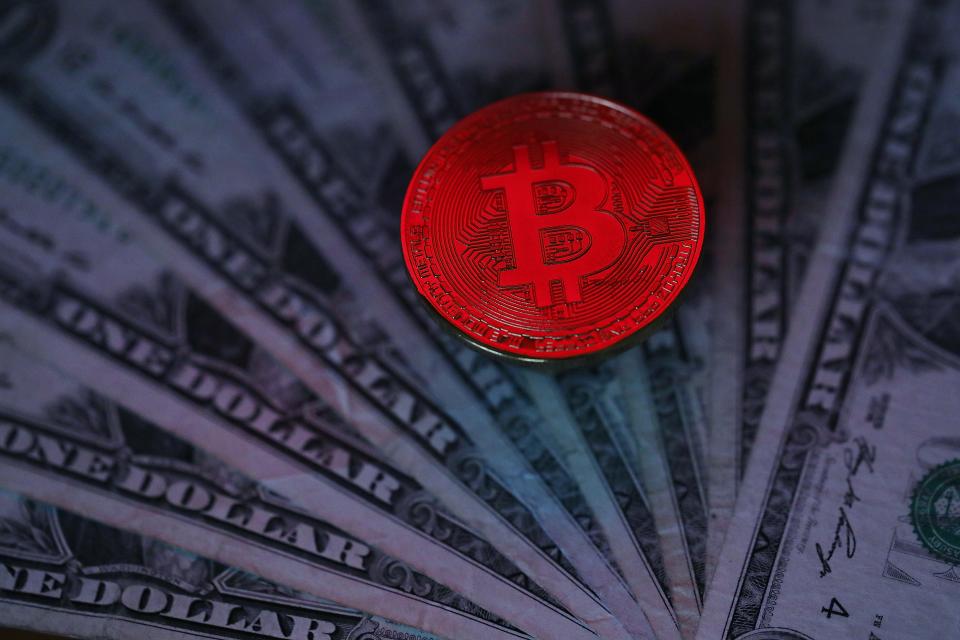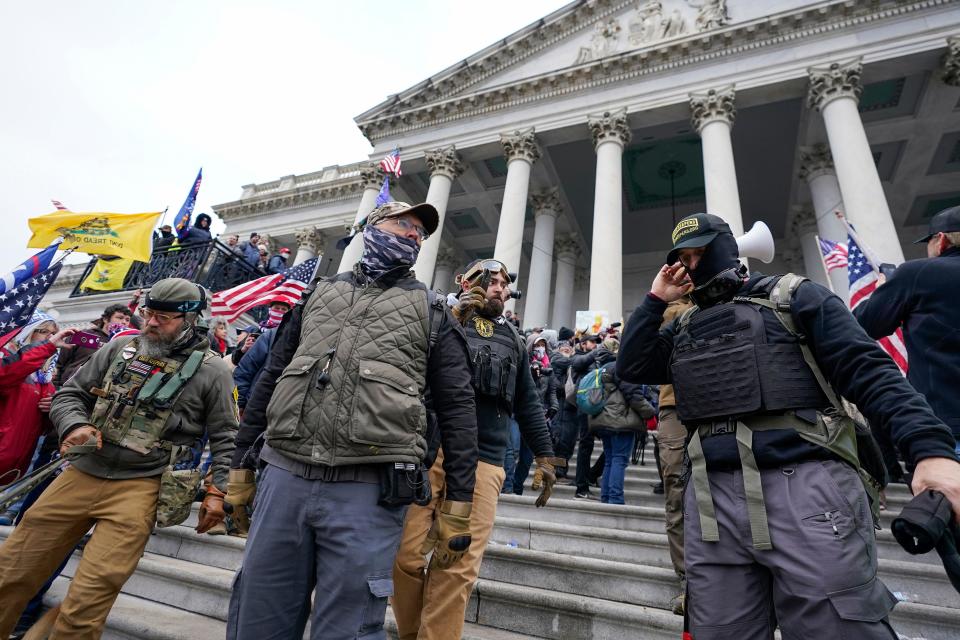Paramilitary groups are illegal in 50 states. Will a new federal law stop them?
Exchanges where customers can convert cryptocurrency into dollars and cents are hosting white supremacists and neo-Nazis, and most have no policies against extremists using their services, USA TODAY reported this week. Meanwhile, a new bill proposed by Congressional Democrats seeks to make militia activity illegal nationwide. And a look at some controversial statistics from the Anti-Defamation League.
It’s the week in extremism.

Crypto exchanges hosting extremists
A USA TODAY story this week looks at an exclusive report from the Anti-Defamation League shedding new light on the use of cryptocurrency exchanges by domestic extremists including neo-Nazis. The report, which tracked more than $140,000 in extremist financing, questions why the exchanges don’t have stronger policies against hosting extremists.
More: Crypto's Nazi problem: With few rules to stop them, white supremacists fundraise for hate
The ADL monitored 15 individual domestic extremists and extremist groups moving cryptocurrency into or out of 22 different crypto exchanges throughout 2023. Exchanges allow holders of cryptocurrency to trade it with other people and exchange it for traditional currency such as U.S. dollars.
The report claims only one of the exchanges in its study has a policy explicitly prohibiting the funding of hate or extremism. It calls on the exchanges to update their policies to explicitly ban extremist fundraising.
The crypto funds traced by the ADL are just a small sliver of what the organization calls a “complex and sprawling ecosystem.” One expert told USA TODAY domestic extremists, who were early adopters of cryptocurrency, are likely sitting on millions of dollars in crypto.
The call for new policies at exchanges comes as antisemitism spikes across the country and as Democrats and Republicans in Congress hotly debate the future regulatory environment for cryptocurrency. Major exchanges told USA TODAY they review their users for illegal activity, and are investigating the ADL’s claims.

Federal law proposed against so-called militias
New legislation proposed in the House and Senate seeks to outlaw paramilitary activity including patrolling and drilling. The federal law would add to state laws against the groups often self-described as “militias,” which as USA TODAY reported in 2021 exist in all 50 states.
The Preventing Private Paramilitary Activity Act was proposed by Sen. Ed Markey from Massachusetts, and Congressman Jamie Raskin of Maryland. It was introduced on the three-year anniversary of the Jan. 6 insurrection.
Militia-style groups played an outsized role on Jan. 6. Stewart Rhodes, who founded the Oath Keepers, was found guilty of seditious conspiracy for the attack, along with four co-defendants. Numerous other members of the Oath Keepers and other groups have been charged in the insurrection.
All 50 states technically have laws on the books outlawing citizen-run groups that engage in law-enforcement or other activities reserved for government agencies. But those laws are seldom used in prosecutions.
“Private paramilitary actors are a threat to our democracy,” Mary McCord, Executive Director of the Institute for Constitutional Advocacy and Protection at the Georgetown University Law Center, said in a statement. McCord said the new legislation, if enacted, would provide the necessary legal tool to prevent those groups from undercutting the democratic process.

Antisemitism tallies, and questions for Anti-Defamation League
The Anti-Defamation League made other news this week as it faced criticism over a study it released showing a huge increase in antisemitic incidents in the last three months of 2023. The study found a 360% increase in incidents compared with the last three months of 2022. But it relied on a broader definition of “antisemitic incidents” than had previously been used.
On Thursday, Jewish-American newspaper The Forward reported the massive spike includes “rallies that feature ‘anti-Zionist chants and slogans,’ events that appear to account for around 1,317 of the total count” (of more than 3,000 incidents). That’s a broader definition than was used previously.
The definition was changed following the Oct. 7 Hamas attack on Israel and was designed to “account for changing times,” a spokesperson for the more than 100-year-old New York-based Jewish advocacy group told USA TODAY.
“While it’s true that ADL has made adjustments to its criteria for assessing anti-Israel incidents, we periodically update our methodology,” the spokesperson said. “Those changes reflect the current state of antisemitism and the impact that some anti-Zionist activity is having on the American Jewish community.”
There’s plenty of other evidence that antisemitism has spiked since the start of the Hamas-Israel war. In New York, for example, antisemitic hate crimes increased more than 200% from October 2022 to October 2023, according to the New York Police Department.
The ADL spokesperson admitted the organization “erred” in not fully explaining its methodology when releasing the latest report. “We have since clarified it in our online methodology and will clarify it again when we release the final audit for 2023,” the spokesperson said.
Statistic of the week: 48
That’s how many months Florida Proud Boy Gilbert Fonticoba was sentenced to serve in federal prison Thursday for his role in the Jan. 6 insurrection at the U.S. Capitol.
More: After Jan. 6 riot, hundreds of identifiable people remain free. FBI arrests could take years
Fonticoba, who marched to the Capitol with a large group of Proud Boys, was convicted of obstruction of an official proceeding and civil disorder, both felonies.
This article originally appeared on USA TODAY: Extremists use crypto exchanges; new bill takes aim at militia groups

